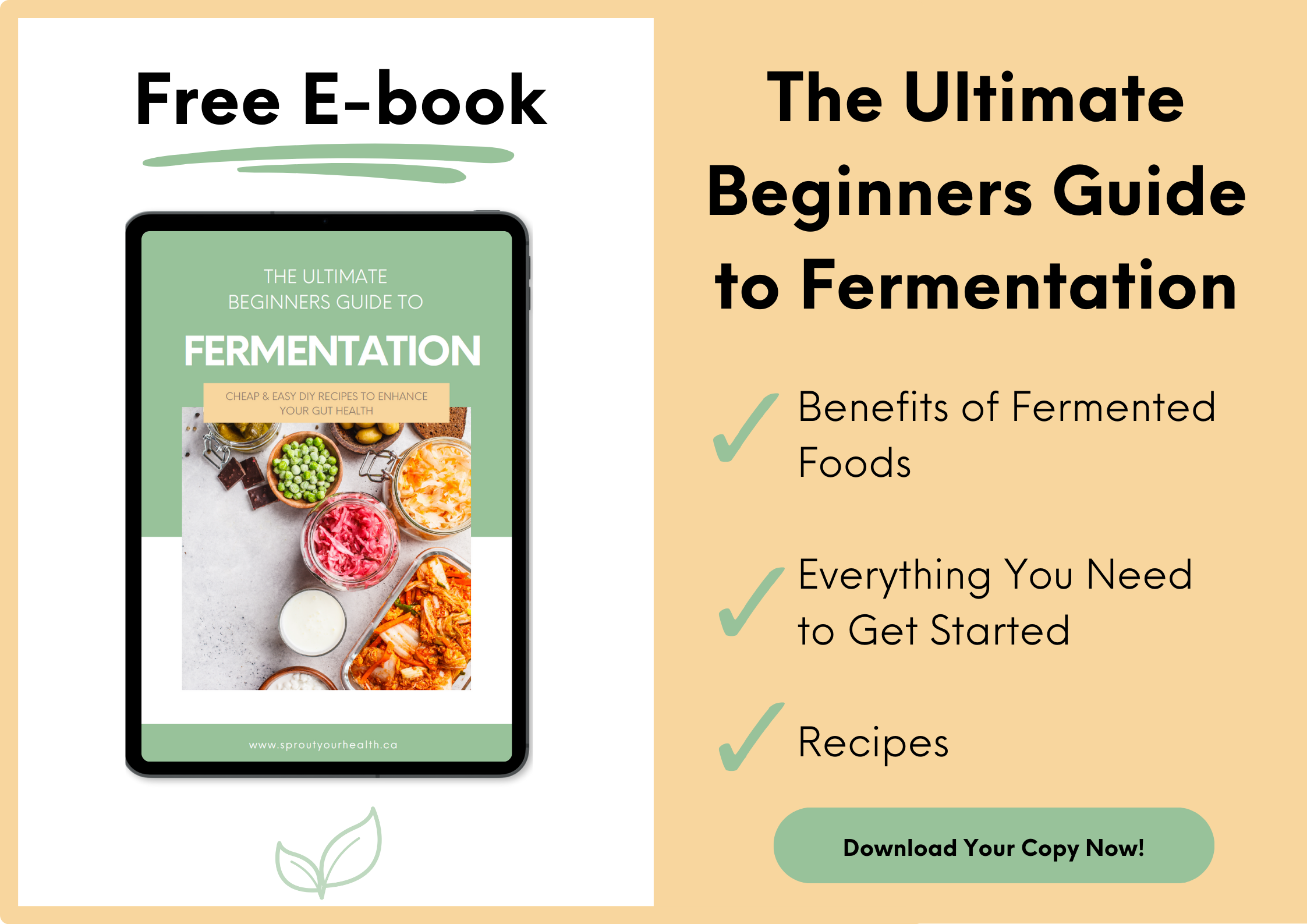5 Healthy Foods That Can Cause Bloating
Did your digestion seem okay until you started trying to be healthy and eat more plant-based foods and then BAM! …out of nowhere you experienced way more bloating than you ever have before?
Which left you so confused…. “I don’t get it? I’m eating all the foods they say are healthy, why am I feeling WORSE?”
The reactions or symptoms you experience after eating certain foods can tell you a lot about how your digestive system is working.
In this blog we’ll be doing a deep dive on one of the main contributing factors influencing bloating: the foods you’re eating. We’ll also take a look at why it’s happening, how to track and understand the relationship between your bloating and foods, as well as the top 5 foods that can make your bloating worse.
Why am I Bloating?
I’m a huge advocate of teaching people WHY their symptoms are happening.
Knowledge is power, and if you can understand what’s going on in your body and the negative impacts it can have on your body, it may be easier to stick to the changes necessary to help you overcome the issue.
Your large intestine is made up of trillions of bacteria which have a symbiotic relationship with your body, which means you help each other survive.
These bacteria ferment carbohydrates and fiber as a normal process in digestion and produce by-products that are beneficial to your body including reducing inflammation, keeping toxins from crossing the gut lining into the blood and keeping bad bacteria at bay.
In a healthy person, the is a healthy balance between these bacteria and everything works well. They help produce vitamins for you, break down toxins, strengthen your immune system and produce digestive enzymes. You have good bowel movements, don’t suffer from digestive issues, skin is health and your mental health is in good condition.
What we see a lot of these days is an unhealthy balance of bacteria, which is known as dysbiosis. The good bacteria levels are lower than they should be, allowing for the bad bacteria to grow and take over, resulting in worse digestive symptoms like bloating, constipation, diarrhea and indigestion.
Dysbiosis can result from infections, chronic stress, inflammation, eating processed foods, overconsumption of alcohol and caffeine, exposure to toxic chemicals, pesticides and overuse of medication like NSAIDs, antibiotics, aspartame etc.
Bloating once in a while is a normal part of digestion but if you’re experiencing bloating it every day or after every meal, that’s an indicator something else is going on and may be worth reaching out to a practitioner who specializes in digestive issues.
Foods that Make You Feel Bloated
Understanding FODMAP’s
When your intestines have an imbalance of this bad bacteria, it’s much more likely that you’ll react to seemingly healthy foods like vegetables, grains, beans and fruits.
You might be wondering well “why can I eat a bell pepper but when I eat broccoli, I get gassy?
Plant foods generally contain higher amounts carbohydrates than the other macronutrients fat or protein. Each plant is made up of different types and combinations of carbohydrates and fibers, which feed various types of bacteria in your gut and may be easier or harder for your body to breakdown and digest depending on the composition of bacteria in your gut.
Some of the most beneficial plants for your gut are the non-digestible, fermentable carbohydrates as these are the types of carbohydrates and fibers that support beneficial gut bacteria that create beneficial by-products called short chain fatty acids that your body needs for a strong, healthy gut lining and good working immune system.
However, they are also the foods that cause the most issues for people.
This category of non-digestible carbohydrates is called FODMAPs which stands for fermentable oligosaccharides, disaccharides, monosaccharides, and polyols. Many healthy plant foods are made up of some of these types of carbohydrates which can be difficult for some to digest depending on the composition of bacteria present in your gut.
Top Foods that Make you Feel Bloated
Beans/legumes: Many people know that beans sometimes give them a little gas. This is because most beans and legumes contain high amounts of resistant starch and oligosaccharides which are fermented in your colon, resulting in gas. If you’re someone with SIBO or IBS, eating these types of foods generally will make your symptoms much worse!
Try This Instead: Soaking, sprouting and pressure-cooking help release enzymes that will help make these foods more digestible, resulting in less symptoms.
Vegetables: veggies high in fructans and inulin can also contribute to bloating in some people. These vegetables include:
Artichokes
Asparagus
Garlic
Onions
Leeks
Dandelions
Try This Instead: Cooking these vegetables in water and straining after or fermenting. Fructans and Galacto-oligosaccharides (GOS) are water soluble and some can leach out into the surrounding liquid1. This will help reduce the overall levels of fructans or GOS, making them easier to digest.
Fermentation can also help lower overall fructan or GOS levels since the bacteria feed on FODMAP’s during the fermentation process, therefore reducing the overall level. If you’re interested in learning how to ferment your own veggies, you can download my free e-book below.
Sugar Alcohol’s: fruits and vegetables high in polyols can contribute to bloating in some people and are found naturally in some fruits and vegetables2 including:
Cruciferous vegetables- cauliflower, cabbage, broccoli, bok choy, Brussel sprouts,
Celery
Mushrooms
Sweet potato
Apple
Apricot
Blackberries
Cherries
Peach
Pear
Plums
Although they’ve started popping up as sugar substitutes in many packaged foods including protein bars, cookies, drinks, candy etc. Watch out for any labels that say “sugar free” and always read the back label. Alternate names to watch out for:
Sorbitol
Mannitol
Xylitol
Lactiol
Maltitol
Erythritol
Try This Instead: It’s best to avoid sugar substitutes as they may have various other negative impacts on your overall health. Stick to low FODMAP natural sugars such as maple syrup, rice malt syrup and whole leaf stevia (not processed).
Whole Grains: they contain resistant starches, fructans and poorly fermentable carbohydrates such as cellulose¹. Grains that contain these types of carbohydrates include:
Wheat
Barley
Rye
Oats
Corn
Try this Instead: If you are not able to digest grains in their whole form, fermented grains may be a better form for you. Fermented grains can significantly reduce the fructan content in grain. Fermented sour dough bread may be a more tolerable form for you. However, it’s important to remember from a nutritional standpoint, bread is still processed and is more of an occasional food than a regular staple in your diet.
Dairy Products: the primary carbohydrate in dairy is lactose. When it’s not broken down in the small intestine (if you lack the lactase enzyme) it becomes a fermentable food for bacteria in your colon. Dairy products that can contribute to bloating include:
Milk
Yogurt
Kefir
Cheese
Ice cream
Cream
Try this Instead: if you struggle to digest lactose containing foods you can try switching to a lactose free version. It’s important to remember that there are other proteins in dairy that you could be reacting to including whey or casein. If eating lactose free doesn’t improve symptoms, it may be best to remove dairy all together as eating a food you react to can have negative impacts on your digestion.
If you’re someone with SIBO or IBS, eating these types of foods generally will make your symptoms much worse so it’s best avoided until you get rid of the bacteria!
The key thing to remember here is that the removal of these foods should only be done temporarily until you understand and correct why you’re not able to eat these foods without bloating.
Foods like beans, lentils, garlic, onion and artichokes are some of the best foods to feed and grow your gut bacteria and to avoid them long term is not a solution, it’s a short-term band-aid approach to manage symptoms. I suggest working with a knowledgeable practitioner who can help you understand why you’re bloating and fix your root cause so that you are able to eat these foods again.
Another thing to note is that bloating can be a symptom of eating foods you are sensitive to.
Your immune system may respond to a food in subtle like headaches, digestive symptoms, skin itching or virtually can show up in any way in your body, which can be a tough one for many people to pin point.
You can start eliminating foods you think may be an issue and see if your symptoms like bloating improve. Common foods people have intolerances to include diary, gluten, nuts, eggs, fish, soy, chocolate, citrus fruit and nightshade vegetables. You can start by eliminating some of these following the directions below and seeing if you notice a difference in your symptoms.
Figuring Out Which Foods Make You Bloated
Listening and analyzing to your body’s signals (i.e. symptoms) can help you narrow down and figure our why it’s happening in the first place and what may be triggering them.
One thing I teach my clients is to track and record the foods they eat and the various symptoms they experience throughout the day, whether it be digestive (bloating, gas, diarrhea, constipation), neurological (anxiety, brain fog, headaches/migraines), skin (rashes, hives, itching) or however else it appears for you. Remember every body is different!
You can download my free Food & Symptom Tracker to start connecting the dots between the foods you’re eating and freequency of your bloating.
How to Use it:
Record all your foods and times you’ve eaten them as well as any symptoms and times you experience them. After each week take a look back over the week and see if you notice certain foods producing the same symptoms over the days.
You may need to complete this for more than one week to get an understanding of any patterns. I also suggest making simple meals during this process with foods you know you don’t react to and trialing one food at a time you think you may have issues with.
If you feel like you need support with this step, I’d be happy to help! After working with many clients, I’ve been able to see patterns to certain foods groups to help you figure out which ones are causing you issues and can set up an action plan to get you eating those foods gain!
Other Factors that Contribute to Bloating
Bloating can be a difficult one to get to the bottom of and food isn’t always necissarily the culprit.
There can be other physiological issues, poor eating habits, underlying infections and of course stress can also play a big part in your overall digestive function. If you’d like to learn more about the other factors that cause bloating and how to reduce them you can read more here.
If you’re bloating is happening all day long (like waking up bloated, bloating after breakfast, lunch and/or dinner) you could be dealing with an underlying infection like a bacterial overgrowth (SIBO), yeast overgrowth or parasites. This is definitely something you want to address sooner than later as it may become more difficult and take more time and effort to overcome in the future versus tackling it now.
If you’re not sure if the freequency and severity of your bloating is something you should be concerned about, you can book a free discovery call where you tell me in more detail about what’s going on and I can advise you on a plan of action.
If you’re interested in learning more free tips and resources to improve your digestive health naturally, sign up for our newsletter below!
By Krista Znebel, R.H.N.©
April 15, 2024


